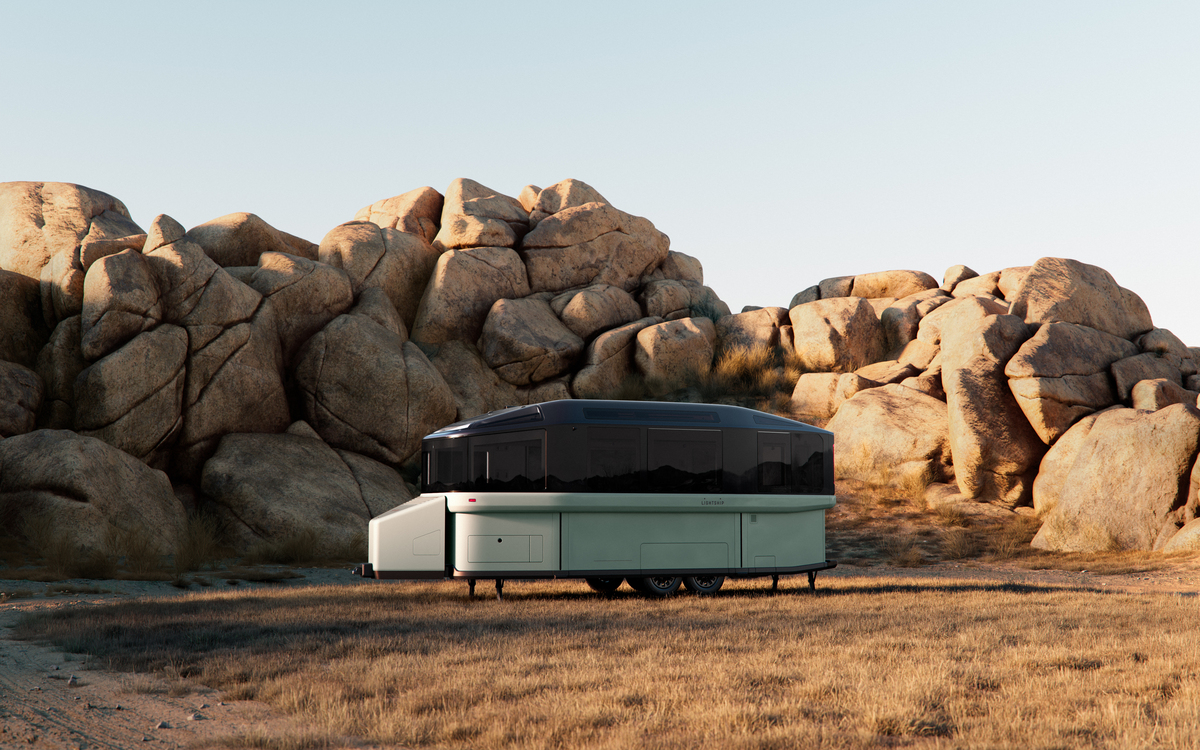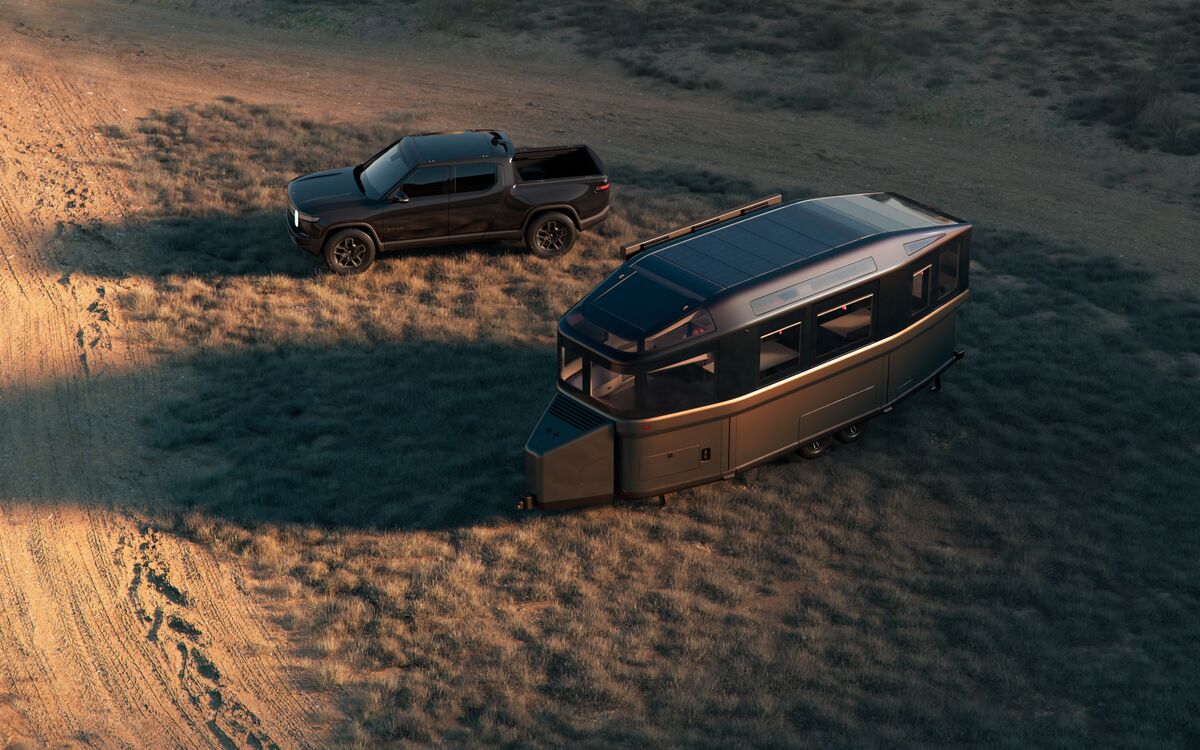The Founding Road Trip
-
Oct. 26, 2022
-
Ben Parker & Toby Kraus
-
20 min read

Their Tesla Model X projected 21 miles of range left — not accounting for the travel trailer they were towing behind them. Lightship co-founders, Ben Parker and Toby Kraus knew they weren’t going to make it to the next charging station.
Not wanting to get stuck on the side of a dimming Utah highway, they dropped the trailer at the next exit and clung to the hope it’d be there when they returned. This wasn’t exactly how they envisioned this trip would go. Or, maybe it was.
After all, the purpose of the trip was to show the challenges surrounding towing with an electric vehicle and validate the need for their new startup: Lightship. Now, they had to contend with the double-edged sword of being right.

From food trucks to electric RVs
Ben was a battery engineer at Tesla, fresh out of the production hell that came to define Tesla’s launch and ramp-up of the Tesla Model 3. Every day he visited the rodeo of food trucks that would descend on Tesla’s Palo Alto campus to provide employees with a convenient outdoor lunch.
The toxic fumes and noise coming from the food trucks’ gas generators felt deeply incongruous with the quiet, pristine atmosphere of the Palo Alto hills. From Ben’s perspective, food trucks didn’t need gas generators, which were not only noisy and smelly but also inefficient – putting out much more power and burning more gasoline than was needed to run their appliances. Food trucks could run all of their appliances with an electric power system, which would use only as much power as was needed.
The more he told people about his food truck project and desire to build a business with high impact and scale, the more RVing came up in conversation, and it became clear to Ben that RV camping and road tripping was the big blank canvas to explore within the world of electrification.
As COVID ramped up into a pandemic and everyone sheltered in place, Ben was desperate to leave his apartment. His antidote to isolation? A 6,000-mile cross-country RV trip - part business research, and part soul-searching opportunity. To him, road trips like this were the epitome of a good vacation - spending time in motion and in a variety of natural settings, meeting up with friends and great new people along the way.
However, there was the matter of his job. While he was excited about the chance to work on the next wave of vehicle electrification, quitting was no easy decision. A gnawing feeling told him that he needed time and space to build out his idea, which he wasn’t going to get by staying in place. Time wasn’t waiting, and the world was only getting weirder, so he threw caution to the wind, rented a Winnebago for the summer, and resigned.
Over the next seven months, Ben bounced between RV parks, Bureau of Land Management campgrounds, and the open road, transforming his diffuse idea into a tangible product. He incorporated from the road and prepared to take his idea to market.
When he got home to the Bay Area, Ben designed and built a prototype of Lightship’s first battery power system for an RV. He invited all his friends to see it cook fully-electric waffles at the park in San Francisco - a self-imposed deadline that led to long days and a great outcome: steaming hot waffles in front of the Golden Gate Bridge, with champagne to boot.
In the afterglow of his electric waffles, however, unforgiving realities set in. Months of sales visits to RV upfitters convinced Ben that it would be challenging to sell his RV power system standalone. Worse, he was quickly running out of personal savings to throw at the fledgling company. He needed to think big, and fast; gradually, the idea to electrify the industry by becoming a full-scale, full-service vehicle manufacturer set in.
The more he thought about it, the more excited he got. Here was an opportunity to design a company and product from the ground up for efficiency and a flawless experience in every part of the vehicle and trip. While the engineer in Ben was ecstatic, the businessman in him was humbled: Lightship needed to raise significant capital - much more than friends and family alone could offer In order to build this into an operation, he needed a partner -someone with a commercial background and experience fundraising. Someone like Toby.

An entrepreneur in-waiting
Toby had dedicated his career to electric mobility. He’d helped bring Tesla’s first mainstream vehicle, the Tesla Model S, to market and launched the electric vehicle technology business at Proterra. While he wanted to continue to work to advance electrification, he was skeptical of how much impact he could have by working for an existing EV manufacturer.
Perhaps he should strike out on his own. As if the universe heard these thoughts, he was approached with a tempting offer to be an Entrepreneur in Residence at a venture firm. After taking this offer, he quickly discovered that the trademark of any good Entrepreneur in Residence, ideating and researching and refining and narrowing to the “big idea,” was not his speed. If he was going to maximize his impact on the electrification movement, he needed a product vision. Something tangible to work on.
Toby’s goal shifted: he was on the hunt for a co-founder. Luckily, by leaning on the vast network of Tesla alumni, his search didn’t take long. After an introduction by his former colleague, Dorian West, Toby soon found himself profile-picture-to-profile-picture on LinkedIn with an engineer named Ben Parker.
When they met, Ben gave Toby the first version of the Lightship pitch: an all-electric RV company that would revolutionize the industry and travel experience. Big promises, Toby thought. But he was shocked by the scale of the market he had previously known little about.
It was massive: one in ten American families has an RV, and out of 500,000 RVs sold every year in the United States, more than 90% are towables.
Toby was intrigued enough to do his own research. Another compelling fact emerged. Market consolidation had left the RV industry with two primary manufacturers, neither of which had made substantial strides in product design, reliability, fuel efficiency, or quality. The RV market was ripe for a new entrant.
Ben described his full vision. A towable RV with a single, clean fuel source that included its own propulsion system to reduce the load on the towing vehicle and effectively negate range loss, the pernicious towing efficiency problem that plagued EVs. The trailer would also be great for non-electric vehicle owners, reducing travel costs with its aerodynamic design and propulsion system. This was it. The product and co-founder Toby was looking for.
The virtual handshake
Over the next month, Ben and Toby cultivated a deep working relationship through phone calls, texts, and video calls. During those conversations, they left no stone unturned.
They got to know one another as people. They joked, explored their values, and discussed their dreams for electrification, the company culture they wanted to build, and what their partnership could achieve.
Most importantly for them, they discovered how complementary they were. Ben was a bit younger and wanted to go for it, all cylinders firing. Toby, on the other hand, was a bit older and more measured. If Toby was the steak, they joked, Ben was the sizzle.
Nothing illustrated this more than when Ben proposed that they try to tow the most aerodynamic travel trailer he could find, a vintage trailer called a Hi-Lo, with an EV from Boulder to San Francisco. Not only would this let them see if EV towing was as painful as they thought, but it would let them finally meet in person. While Toby thought this idea was insane, he also viewed it as necessary. After all, if they couldn’t figure out how to do something as crazy as plan this trip, how could they expect to build a company together? So, the two virtually shook hands, cemented their partnership, and planned their trip.

Colorado to California
Ben guessed their Model X had just enough payload capacity to tow the most aerodynamic travel trailer he was able to rent. Plus, there was a new supercharger in Wells, Nevada, so there was no way they’d actually get stuck.
After arriving in Boulder, Ben finally met Toby in the flesh. In the company of two other colleagues - Dorian, who’d introduced them, and Jennifer Yu, a friend who helped Ben craft his first pitch - they ascended Royal Arch overlooking the City of Boulder and shared their first beer together. Tastes better in person, that’s for sure. The next morning, they started heading west.
Their long conversations were only punctuated by rest stops and charging stations. After hitting every Supercharger on I-70 through the Rockies and eastern Utah, a stiff headwind upended their plans and the Model X range projection read the fateful “21 miles”.
After dropping the trailer off, they crawled at 40 miles an hour down the highway toward the next supercharger. The 18-wheelers were none too pleased. Neither were they. Two hours later they came back to find their trailer was still there. They hitched up and headed back to the supercharger for a second time.
The remainder of the trip proceeded somewhat more normally. Charging stops every 75 miles, a broken vent cover which made a terrible screeching whenever the vehicle's roof was raised, a freezing night in Nevada due to a broken heater. As Ben and Toby would learn, mild inconveniences to moderate hardships have come to characterize the status quo of RVing.
The two eventually crossed into California and reached San Francisco. Ben dropped Toby off at San Francisco International Airport and the two hugged it out. It had been an exhausting journey but it had illuminated the potential of what Lightship was poised to do. The road trip had come to an end and the journey to revolutionize electrified travel had begun.
Pick Your AE.1 Journey
Learn more
Why I Chose an AE.1
09.16.2025

Meet the AE.1™ Cosmos Edition
12.11.2024

Where does the name Lightship come from?
10.29.2024






-700x555.png)